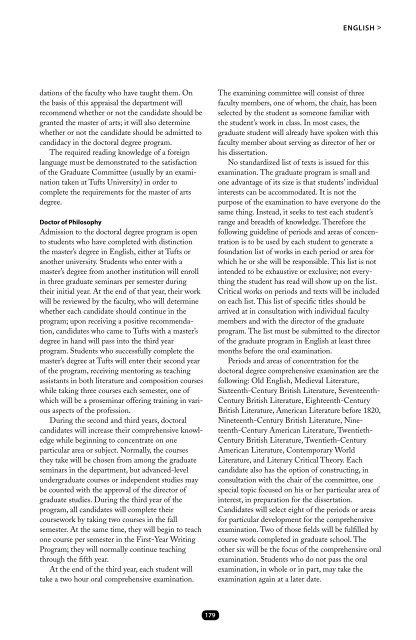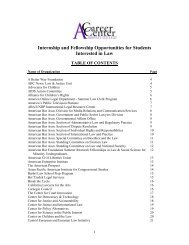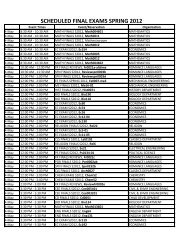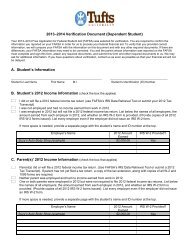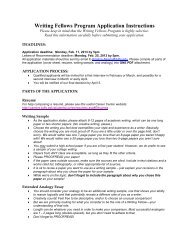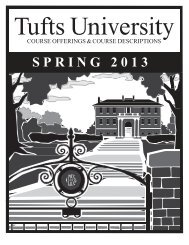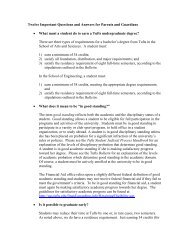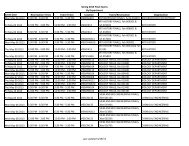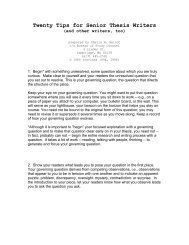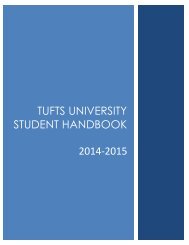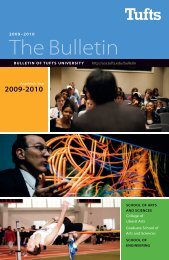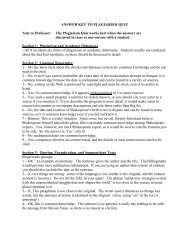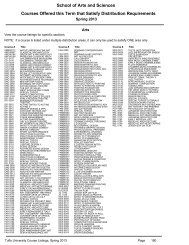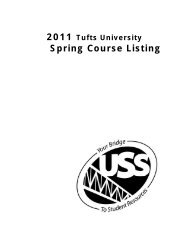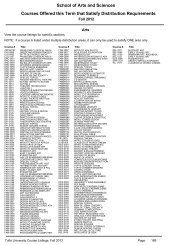2013â2014 The Bulletin - USS at Tufts - Tufts University
2013â2014 The Bulletin - USS at Tufts - Tufts University
2013â2014 The Bulletin - USS at Tufts - Tufts University
You also want an ePaper? Increase the reach of your titles
YUMPU automatically turns print PDFs into web optimized ePapers that Google loves.
English ><br />
d<strong>at</strong>ions of the faculty who have taught them. On<br />
the basis of this appraisal the department will<br />
recommend whether or not the candid<strong>at</strong>e should be<br />
granted the master of arts; it will also determine<br />
whether or not the candid<strong>at</strong>e should be admitted to<br />
candidacy in the doctoral degree program.<br />
<strong>The</strong> required reading knowledge of a foreign<br />
language must be demonstr<strong>at</strong>ed to the s<strong>at</strong>isfaction<br />
of the Gradu<strong>at</strong>e Committee (usually by an examin<strong>at</strong>ion<br />
taken <strong>at</strong> <strong>Tufts</strong> <strong>University</strong>) in order to<br />
complete the requirements for the master of arts<br />
degree.<br />
Doctor of Philosophy<br />
Admission to the doctoral degree program is open<br />
to students who have completed with distinction<br />
the master’s degree in English, either <strong>at</strong> <strong>Tufts</strong> or<br />
another university. Students who enter with a<br />
master’s degree from another institution will enroll<br />
in three gradu<strong>at</strong>e seminars per semester during<br />
their initial year. At the end of th<strong>at</strong> year, their work<br />
will be reviewed by the faculty, who will determine<br />
whether each candid<strong>at</strong>e should continue in the<br />
program; upon receiving a positive recommend<strong>at</strong>ion,<br />
candid<strong>at</strong>es who came to <strong>Tufts</strong> with a master’s<br />
degree in hand will pass into the third year<br />
program. Students who successfully complete the<br />
master’s degree <strong>at</strong> <strong>Tufts</strong> will enter their second year<br />
of the program, receiving mentoring as teaching<br />
assistants in both liter<strong>at</strong>ure and composition courses<br />
while taking three courses each semester, one of<br />
which will be a proseminar offering training in various<br />
aspects of the profession.<br />
During the second and third years, doctoral<br />
candid<strong>at</strong>es will increase their comprehensive knowledge<br />
while beginning to concentr<strong>at</strong>e on one<br />
particular area or subject. Normally, the courses<br />
they take will be chosen from among the gradu<strong>at</strong>e<br />
seminars in the department, but advanced-level<br />
undergradu<strong>at</strong>e courses or independent studies may<br />
be counted with the approval of the director of<br />
gradu<strong>at</strong>e studies. During the third year of the<br />
program, all candid<strong>at</strong>es will complete their<br />
coursework by taking two courses in the fall<br />
semester. At the same time, they will begin to teach<br />
one course per semester in the First-Year Writing<br />
Program; they will normally continue teaching<br />
through the fifth year.<br />
At the end of the third year, each student will<br />
take a two hour oral comprehensive examin<strong>at</strong>ion.<br />
<strong>The</strong> examining committee will consist of three<br />
faculty members, one of whom, the chair, has been<br />
selected by the student as someone familiar with<br />
the student’s work in class. In most cases, the<br />
gradu<strong>at</strong>e student will already have spoken with this<br />
faculty member about serving as director of her or<br />
his dissert<strong>at</strong>ion.<br />
No standardized list of texts is issued for this<br />
examin<strong>at</strong>ion. <strong>The</strong> gradu<strong>at</strong>e program is small and<br />
one advantage of its size is th<strong>at</strong> students’ individual<br />
interests can be accommod<strong>at</strong>ed. It is not the<br />
purpose of the examin<strong>at</strong>ion to have everyone do the<br />
same thing. Instead, it seeks to test each student’s<br />
range and breadth of knowledge. <strong>The</strong>refore the<br />
following guideline of periods and areas of concentr<strong>at</strong>ion<br />
is to be used by each student to gener<strong>at</strong>e a<br />
found<strong>at</strong>ion list of works in each period or area for<br />
which he or she will be responsible. This list is not<br />
intended to be exhaustive or exclusive; not everything<br />
the student has read will show up on the list.<br />
Critical works on periods and texts will be included<br />
on each list. This list of specific titles should be<br />
arrived <strong>at</strong> in consult<strong>at</strong>ion with individual faculty<br />
members and with the director of the gradu<strong>at</strong>e<br />
program. <strong>The</strong> list must be submitted to the director<br />
of the gradu<strong>at</strong>e program in English <strong>at</strong> least three<br />
months before the oral examin<strong>at</strong>ion.<br />
Periods and areas of concentr<strong>at</strong>ion for the<br />
doctoral degree comprehensive examin<strong>at</strong>ion are the<br />
following: Old English, Medieval Liter<strong>at</strong>ure,<br />
Sixteenth-Century British Liter<strong>at</strong>ure, Seventeenth-<br />
Century British Liter<strong>at</strong>ure, Eighteenth-Century<br />
British Liter<strong>at</strong>ure, American Liter<strong>at</strong>ure before 1820,<br />
Nineteenth-Century British Liter<strong>at</strong>ure, Nineteenth-Century<br />
American Liter<strong>at</strong>ure, Twentieth-<br />
Century British Liter<strong>at</strong>ure, Twentieth-Century<br />
American Liter<strong>at</strong>ure, Contemporary World<br />
Liter<strong>at</strong>ure, and Literary Critical <strong>The</strong>ory. Each<br />
candid<strong>at</strong>e also has the option of constructing, in<br />
consult<strong>at</strong>ion with the chair of the committee, one<br />
special topic focused on his or her particular area of<br />
interest, in prepar<strong>at</strong>ion for the dissert<strong>at</strong>ion.<br />
Candid<strong>at</strong>es will select eight of the periods or areas<br />
for particular development for the comprehensive<br />
examin<strong>at</strong>ion. Two of those fields will be fulfilled by<br />
course work completed in gradu<strong>at</strong>e school. <strong>The</strong><br />
other six will be the focus of the comprehensive oral<br />
examin<strong>at</strong>ion. Students who do not pass the oral<br />
examin<strong>at</strong>ion, in whole or in part, may take the<br />
examin<strong>at</strong>ion again <strong>at</strong> a l<strong>at</strong>er d<strong>at</strong>e.<br />
179


